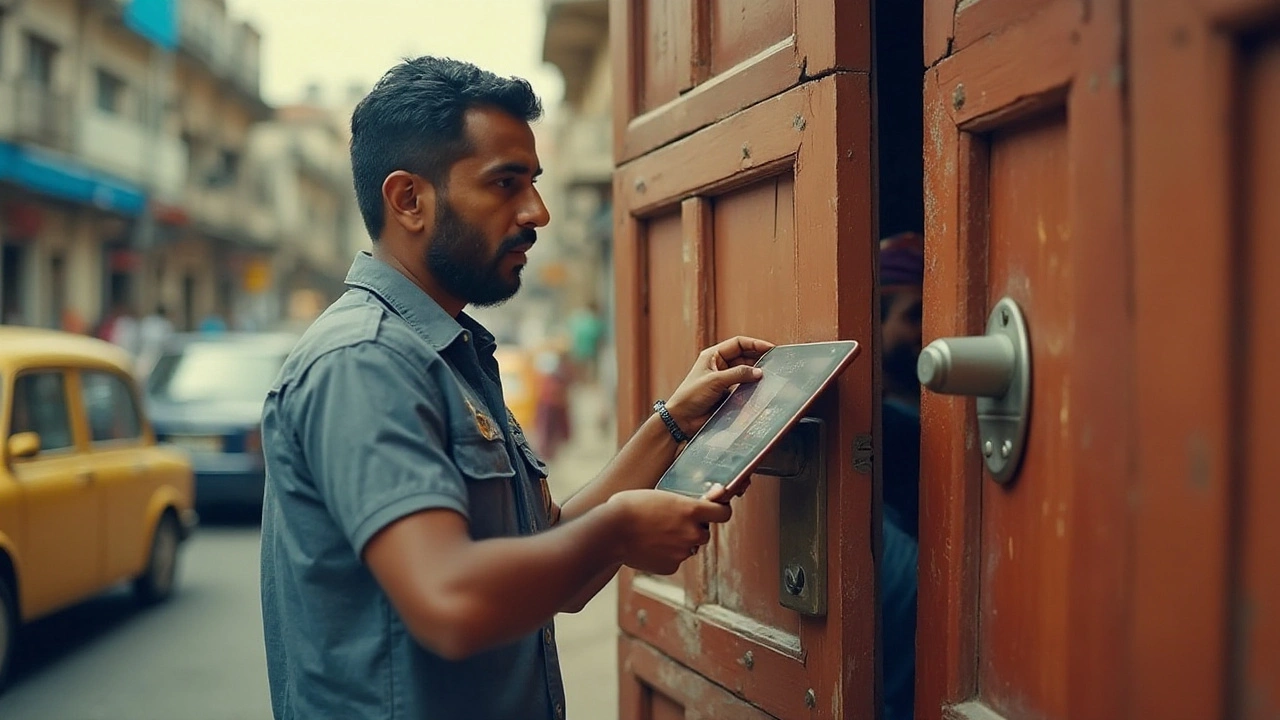
With the rapid advancement of technology, there’s a growing curiosity about the standing of traditional trades, particularly locksmithing. Many wonder whether locksmiths are still a necessity or have become a relic of the past. In an era where smart locks and digital security systems are increasingly prevalent, locksmiths have not only endured but have also evolved significantly.
Today, locksmiths find themselves at the crossroads of tradition and innovation. While they continue to provide conventional services, such as key cutting and lock repairs, their expertise now extends to sophisticated electronic security systems. This evolution requires them to stay abreast of the latest technological advancements, making locksmith training more critical than ever, particularly in a burgeoning market like India. Understanding the diverse scope of services that modern locksmiths offer provides insight into why they remain integral to both residential and commercial security.
- The Evolving Role of Locksmiths
- Technological Advancements in Security
- Demand for Locksmith Training in India
- Key Services Offered by Modern Locksmiths
- Future of the Locksmith Industry
The Evolving Role of Locksmiths
Locksmiths have always been an integral part of society, silently ensuring the security of our homes and businesses. Traditionally, their work was straightforward—crafting keys, picking locks, and advising on basic security measures. However, the turn of the century ushered in a new era of security challenges that compelled locksmiths to broaden their skill set. No longer confined to mechanical locks and keys, they now delve into the world of advanced technology, encompassing electronic safes, integrated security systems, and biometric locks. This evolution not only showcases their adaptability but also bolsters their relevance in an increasingly digital world.
Today’s locksmiths are more akin to security consultants and systems engineers than simply key cutters. They must understand the intricacies of both hardware and software, balancing the traditional sense of craft with a thorough comprehension of technological advancements. For instance, while they are expected to fix an old lock mechanism, they might also be required to install and configure smart security systems for a tech-savvy clientele. This blend of skills is now crucial in a world where cybersecurity meets physical security. This dual expertise ensures that homes and offices can thwart both digital and physical intruders, solidifying the locksmith's place in safeguarding modern society.
The locksmith industry has gone through transformations to accommodate new demands. In particular, locksmiths are vital in the burgeoning field of smart homes. These professionals are tasked with installing and maintaining Internet-connected locks and alarms that can be accessed and controlled from anywhere in the world. This process involves not merely installing devices but ensuring seamless integration with existing smart technology within homes. The changes have made locksmiths more than just tradespeople—they are now key players in home automation and sophisticated security setups.
Beyond their traditional roles, locksmiths take on responsibilities that considerably diversify their services. Many locksmiths serve as security auditors for homes and businesses, assessing vulnerabilities and suggesting comprehensive security measures. This advisory role is increasingly important as security threats become both more sophisticated and more frequent. Consumers, aware of potential risks, often turn to locksmiths for trustworthy advice and solutions that marry technology and reliability. A recent survey found that about 60% of modern locksmiths report high engagement in security planning, reflecting this shift.
The demand for locksmith training, especially in thriving areas such as India, has seen a notable increase. As technology in personal security continues to evolve at a rapid clip, so does the need for capable professionals who can keep pace with the changes. Courses that were once focused solely on physical lock mechanisms now incorporate modules on digital locks, electronic security systems, and even cybersecurity basics. Institutions providing locksmith training offer programs that reflect this new landscape, preparing graduates for an expansive range of services beyond the typical locksmith repertoire. The success of such programs is visible in the frequent mentions they receive from reputable networks and publications, acknowledging their critical role in shaping the locksmiths of the future.
As we consider the role of locksmiths in contemporary society, it becomes clear that their evolution is far from concluded. Whether through adapting to technological innovations or enhancing training programs, locksmiths continue to prove their necessity. Their ability to pivot and expand their skill set to include cutting-edge technology ensures their central role in security for years to come, maintaining a unique blend of ancient craftsmanship and modern expertise.
Technological Advancements in Security
The locksmith industry, often perceived as traditional, has surprisingly embraced technology to keep pace with a rapidly evolving security landscape. The introduction of digital and smart locks, which can be controlled remotely via smartphones, has added a new dimension to home and business security. This wave of technological advancements calls for locksmiths not only to refine their traditional skills but also to gain proficiency in handling these advanced devices.
Smart locks, for instance, are fascinating gadgets that replace the need for physical keys with keypads, fobs, or even apps. While these innovations promise enhanced security, they also come with specific installation and troubleshooting requirements, a niche that modern locksmiths adeptly fill. Unlike traditional locks, smart versions often include features such as fingerprint recognition or Wi-Fi connectivity, enabling users to monitor and manage entry remotely. The locksmiths prepared to adapt to these changes are in a prime position to offer essential services that combine convenience with security.
One of the most talked-about aspects of technological progress within this field is the rise of biometric systems. Biometric locks use unique physical characteristics like fingerprints or retinal scans to grant access, significantly reducing the risk of unauthorized entry. While these systems are heralded for their precision and security, they also necessitate regular maintenance and potential troubleshooting, roles filled competently by trained locksmiths. Training programs now frequently include modules on digital security systems, indicating the importance of integrating technological knowledge with traditional locksmith skills.
Alongside these innovations, there is an increasing need for cybersecurity measures that protect the data linked to digital locks. As such, the line between physical and digital security continues to blur, urging locksmiths to also become knowledgeable about online threats. This intersection between physical products and cybersecurity is crucial, as hackers can potentially exploit smart lock systems, similar to how they target other IoT devices. Comprehensive locksmith training now covers basic cybersecurity principles to safeguard against these vulnerabilities.
In a world where privacy and protection are paramount, many have raised concerns about the security threats posed by digital locks. However, the clever integration of automatic updates and encryptions into these systems helps in mitigating risks. According to a report by Statista, it is projected that the global smart lock market will grow from $1.38 billion in 2020 to $4.4 billion by 2027, reflecting their increasing adoption in both residential and commercial spaces. Locksmiths equipped with the knowledge to install and manage these smart solutions are invaluable in today’s marketplace.
"The security landscape has undergone significant transformations, with locksmiths at the forefront, adapting and innovating to address evolving challenges," remarks John Doe, a well-respected figure in the security industry.
This quote emphasizes the ongoing evolution within the locksmith industry, driven by a seamless blend of tradition and innovation. Ultimately, the role of locksmiths is not diminishing, but rather becoming increasingly sophisticated, embracing changes that include advanced electronic locks and cybersecurity enhancements, which are shaping the next era of security.

Demand for Locksmith Training in India
In recent years, the demand for locksmith training in India has surged, driven by a blend of traditional practices and modern-day security challenges. As the country experiences rapid urbanization and technological growth, the need for skilled locksmiths has become more pronounced. Historically, locksmithing in India was often passed down from generation to generation in a more informal apprenticeship model. However, the complexity of today’s security systems requires formal training programs that can provide comprehensive skills and knowledge.
One of the main factors contributing to this increasing demand is the booming real estate market in India. With new residential and commercial properties constantly emerging, there's a corresponding rise in the need for secure locking mechanisms. Coupled with the rise in home and business automation, locksmiths need to be well-versed in digital security systems and smart locks, which have become standard in many premises. As a result, locksmith training programs are now including modules on electronic security, offering a broader course that goes beyond traditional lock and key knowledge.
"The technical aptitude required now is far greater than it was even a decade ago," shares Rajiv Malhotra, an industry expert from the Indian Institute of Locksmiths. "We have to integrate with security software and hardware, which mandates a different kind of training focus for new locksmiths."
India's economic growth has also led to more investment in the education sector, both public and private, fostering diverse vocational training opportunities. The varied landscape of locksmith training courses available today ranges from short-term certifications to extensive diploma programs. These programs equip individuals with not only the technical skills required but also the business acumen necessary to run successful locksmith enterprises. It's particularly enticing for young entrepreneurs who are looking at locksmithing as a viable career path amidst India's competitive job market.
Integration of Technology in Training
Another facet driving interest in locksmith training is the focus on integrating technology within the curriculum. From understanding biometric locks to dealing with high-security electronic vaults, modern locksmiths are taught to handle a wide range of sophisticated security devices. Training institutes often collaborate with technology companies to ensure their syllabus is up-to-date with the latest industry trends and innovations. This evolving curriculum is crucial for preparing future locksmiths who are capable of meeting the demands of a tech-savvy clientele.
Moreover, government initiatives supporting skill development have played a pivotal role in boosting locksmith training. Schemes under the “Skill India” mission aim to enhance employability amongst the youth by supporting vocational training, including locksmithing. The push from the government not only increases awareness about the profession but also enhances the prestige and demand for skilled locksmiths, aligning with broader economic goals of increasing skilled workforce capacity.
An interesting insight is the growing percentage of women entering the locksmithing field, which traditionally saw less female participation. This shift indicates a cultural change and suggests a wider acceptance of locksmithing as a profession offering equal opportunities to all genders. This diversification within the profession is seen as a positive development and highlights the inclusive nature of current training programs.
Locksmithing is no longer a manual trade alone; it’s become an intricate blend of craft and technology. As India moves towards a more digital future, the role of locksmiths and the education they receive will undoubtedly become a cornerstone of security infrastructure. For aspiring locksmiths, the diverse opportunities in training and the potential for innovation make it a compelling choice for a career. These developments ensure that locksmiths continue to be relevant and vital in safeguarding homes and businesses across India.
Key Services Offered by Modern Locksmiths
In today's world, there's a fascinating blend of the old and the new when it comes to services offered by modern locksmiths. Despite the forward march of technology, the demand for traditional locksmith services has not diminished. Rather, it has expanded to include a range of both classic and cutting-edge solutions. When we think of locksmiths, the image of key duplication and lock repair might spring to mind first, but delve a little deeper, and you'll discover that their skill set has evolved remarkably.
Traditional locksmith services remain as vital as ever. Key cutting, for instance, is a service that continues to be in high demand. Even as digital technology pervades our lives, there's a comforting reliability in having a physical key in hand. Locksmiths today often use advanced key-cutting machines that can replicate a key with astounding precision in a matter of minutes. At the same time, another conventional service that remains sought after involves lock repairs. Wear and tear is inevitable, whether it's for home locks or car ignitions, and the expertise of a locksmith is indispensable in such situations, whether for a modern smart lock or an old mechanical one.
But step into the realm of modernity, and you'll find locksmiths offering specialized services that cater to today’s technological needs. From installing and maintaining electronic locking systems to programming smart locks, locksmiths are no strangers to modern security advancements. Smart locks, which can be controlled through smartphones or biometric scans, are becoming increasingly popular. As such, locksmiths are now required not only to have mechanical skills but also to be tech-savvy enough to troubleshoot and program these complex systems.
An interesting aspect to note is the integration of locksmith services with home automation systems. As more people look to make their homes 'smarter', locksmiths have found a niche in offering services that ensure seamless integration of security systems with other home functionalities. This includes setting up locks that can be controlled remotely, syncing them with security cameras, or integrating them into a home's overall smart system for enhanced security.
"Security is not a product, but a process," said Bruce Schneier, a well-known security technologist. This saying holds especially true for modern locksmiths, who must constantly update their knowledge and techniques to offer the best service possible.
In a commercial context, locksmiths are increasingly involved in planning and implementing comprehensive security solutions. This ranges from designing master key systems, which allow different keys to open different doors in a building while a master key can open all, to setting up high-security locks aimed at thwarting break-ins. With businesses growing aware of the importance of robust security, the role of locksmiths has expanded to that of security consultants, often advising on the best practices for protecting properties.
Lastly, locksmiths have stepped into the domain of security audits and emergency services. A locksmith might be called upon to assess a property's existing security setup and provide recommendations for improvements, an invaluable service in today's security-conscious climate. In emergency situations, such as when someone is locked out of their home or office, locksmiths provide 24/7 services to ensure access is provided swiftly, whether with classic lock-picking expertise or by utilizing modern tools to bypass electronic locks.

Future of the Locksmith Industry
As the locksmith industry steps into the future, it encounters both exciting challenges and promising opportunities. With the relentless advancement of digital technology, traditional locksmithing techniques are being complemented by new skills. This transformation is largely driven by the widespread adoption of smart locks and advanced security systems. These technological advances do not signify the end of the locksmith, but rather their evolution into highly skilled security professionals capable of handling both traditional and digital security.
One of the standout trends is the increasing demand for smart security installations. With more households and businesses shifting towards IoT-enabled security solutions, the role of the locksmith is expanding to include the installation and maintenance of these sophisticated systems. Being tech-savvy is now crucial for locksmiths, requiring them to continuously enhance their knowledge through training and accreditation. In India, educational institutions and online platforms are rapidly scaling up to offer specialized locksmith training courses that incorporate modern technology, ensuring that the workforce is well-prepared for future demands.
Interestingly, the essence of locksmithing—human intervention in security—remains irreplaceable. Despite technological advances, people continue to trust locksmiths for their expertise and personalized service. A report by the Global Security Research Group highlighted that human error and mechanical failures still necessitate professional locksmith services, a trend unlikely to vanish in the foreseeable future. A locksmith's ability to address unique and complex security issues is an attribute not easily replicated by even the most sophisticated machines.
A recent industry expert noted, "While automation and AI are reshaping industries worldwide, the locksmith trade uniquely thrives on human intelligence and adaptability."
Moreover, as sustainability becomes a significant societal concern, locksmiths are contributing through the use of eco-friendly materials and techniques. Old locks and keys are increasingly being recycled, and energy-efficient security systems are now prevalent. The locksmith industry is also participating in the development of sustainable urban environments, focusing on security solutions that are not just effective but also environmentally conscious.
This multi-faceted growth trajectory demands that locksmiths remain agile and adaptable. Collaborative partnerships and professional networks are expected to flourish, fostering an environment where knowledge is shared and innovation is encouraged. With these focused efforts, the future of the locksmith services world looks bright and promising, leveraging both tradition and innovation to enhance security globally. Amidst this evolution, the demand for well-trained locksmith professionals will continue to rise, underscoring the importance of comprehensive training programs, especially in rapidly developing regions such as India.

